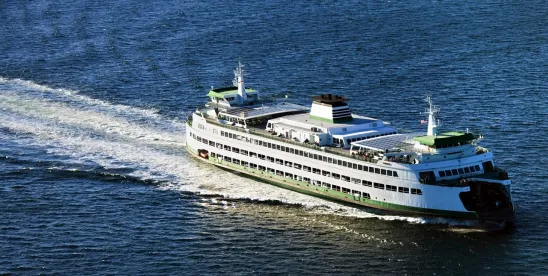On December 23, 2022, President Biden signed into law House of Representatives Bill 7776, the “James M. Inhofe National Defense Authorization Act for Fiscal Year 2023,” which primarily contained appropriations for the Department of Defense, Department of Energy, Department of State, etc. That said, part of the bill also amended the Limitation of Liability Act, 46 U.S.C. 30501, et seq. (Limitation Act), which will impact vessel owners and operators. Namely, certain small passenger vessels have now been removed from the Limitation Act’s ambit of protection.
Originally enacted in 1851, through the Limitation Act, Congress sought to place American shipowners on the same competitive ground as their foreign counterparts[1] and wanted to encourage shipbuilding and investment in the growing international maritime industry. The Limitation Act’s provisions are elementary: It places a cap on liability of a vessel owner for damages caused by the vessel to the vessel’s value at the time of an incident and its pending freight. The Limitation Act allows a vessel owner to limit its liability for claims subject to limitation, so long as the damages are “done, occasioned, or incurred[] without the privity or knowledge of the owner.”[2] Likewise, the Limitation Act permits a vessel owner who faces potential liability for a maritime casualty to file suit in federal court and invoke a concursus proceeding, in which all claimants must file their claims.[3]
Since its original passage in 1851, the Limitation Act has been amended by Congress only three times — first in 1884, then in 1935, and now in 2022. The 1884 amendment added a provision to apportion limitation among multiple owners of a ship and excluded a seaman’s wage claims from limitation.[4] Likewise, the 1935 amendment — passed in response to a vessel owner limiting its liability to $20,000 for the loss of 134 passengers — sought to increase the limitation fund available to personal injury or death claimants. The amendment originally required a vessel owner to fund $60 per gross ton of the vessel to satisfy personal injury or death claims regardless of the vessel’s actual value. Today, the vessel owner must fund $420 per gross ton.[5] In addition, the 1935 amendment set a six-month deadline for vessel owners to invoke the protections of the Limitation Act.[6]
Just as in 1935, a recent maritime disaster sparked public outcry for another amendment to the act. On September 2, 2019, the P/V CONCEPTION, a dive boat carrying 33 passengers and six crew members, caught fire and sank off the coast of California, resulting in the deaths of 34 people — 33 passengers and one crew member. Days after the incident, the vessel owners instituted a limitation action in the US District Court for the Central District of California seeking to limit their liability to the value of the vessel, which was zero considering it was a total loss.
In response to the incident and limitation action, in September 2021, two California lawmakers proposed the Small Passenger Vessel Liability Fairness Act of 2021.[7] The initial bill went through several iterations and changes, but the final language was included in H.R. 7776, which became law on December 23, 2022.
In short, the Small Passenger Vessel Act (SPVA) carves out certain small passenger vessels from being able to limit their liability to the value of the vessel. Stated another way, said vessels will be held liable for any and all losses arising from a maritime casualty.
First, the SPVA defines “small passenger vessels” as ones carrying not more than 49 passengers on an overnight domestic voyage and not more than 150 passengers on any voyage that is not an overnight domestic voyage, and it includes any wooden vessel constructed prior to March 11, 1996, carrying at least one passenger for hire.[8] Second, the SPVA then amends 46 U.S.C. § 30502 of the Limitation Act to exclude “covered small passenger vessels” from its application. Finally, the SPVA prohibits a small passenger vessel’s owners from being able to contractually limit the time period for giving notice of a claim or bringing a claim for personal injury or death. Now, with respect to small passenger vessels, claimants will have no less than two years from the date of the injury or death to give notice of a claim and to file suit.[9]
Although initially targeted to the P/V CONCEPCION disaster, the amendment will impact many other small passenger vessel owners and operators. This amendment will apply to any type of crew boat or crew transfer vessel used on the Mississippi River or in the Gulf of Mexico to transport crew to work sites on navigable waters. What remains to be seen is how the amendment will affect certain concursus proceedings involving multiple vessels. For example, assume a dredge working with a flotilla of vessels catches fire and the crew boat used to transport crew members tragically sinks. The dredge owners would be able to file a limitation action, but under the SPVA, the crew boat will no longer be able to seek limitation. Likewise, under the flotilla doctrine, would the value of the crew boat be included in the dredge’s limitation fund? Or would it be completely excluded? Quite simply, the specific carve-out of passenger vessels from the Limitation Act may result in procedural and substantive conundrums in future cases.
This amendment will apply prospectively only, and, as such, vessel owners and operators should be aware of this significant legislation affecting the defenses afforded to vessel owners.
FOOTNOTES
[1] By 1851, the concept of “limited liability” for vessel owners and operators and the codification for same had already permeated throughout European nations, including Germany, France, and England. See James J. Donovan, The Origins and Development of Limitation of Shipowners’ Liability, 53 Tul. L. Rev. 999, 1000–01 (1979). Mark A. White, The 1851 Shipowners’ Limitation of Liability Act: Should the Courts Deliver the Final Blow?, 24 N. Ill. U. L. Rev. 821 (2004).
[2] 46 U.S.C. § 30505(b).
[3] 46 U.S.C. § 30511.
[4] Act of June 26, 1884, ch. 121, 23 Stat. 53 (codified at 46 U.S.C. § 30506).
[5] White, supra note 3 at 834–35.
[6] The US Fifth Circuit Court of Appeals recently held that this six-month deadline is not jurisdictional. In re Bonvillian Marine Services, 2021 AMC 454 (5th Cir. 2021).
[7] https://carbajal.house.gov/news/documentsingle.aspx?DocumentID=967.
[8] See 46 U.S.C. § 30501. This amended provision of the Limitation Act also cross-references 46 U.S.C. § 2101, which defines “passenger vessel” as a vessel “of at least 100 gross tons."
[9] The SPVA has also renumbered and redesignated sections of Title 46, Chapter 305 of the United States Code.




 />i
/>i

